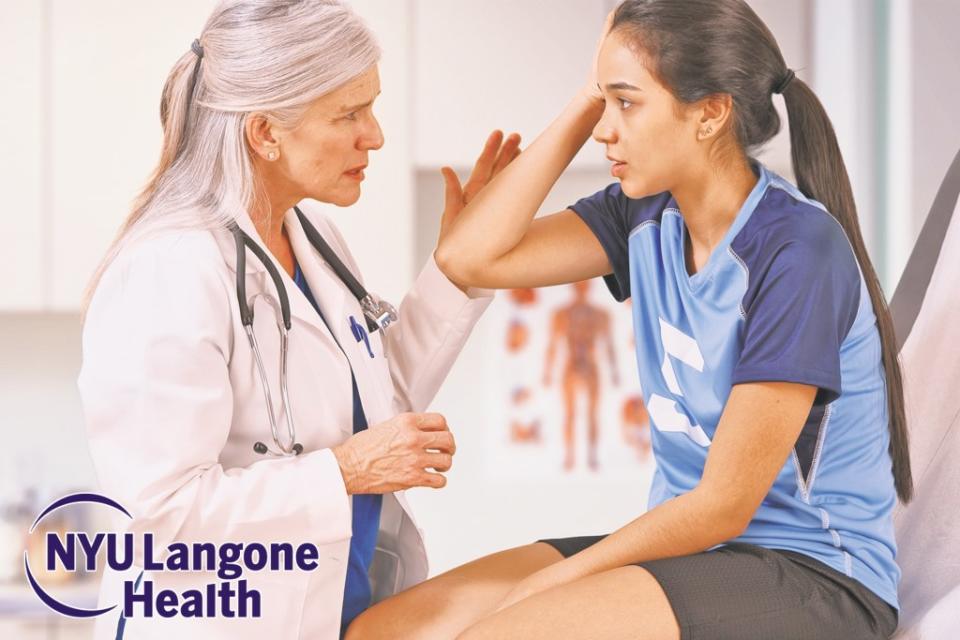I’m a doctor — and here’s what I want you to know about concussions

A concussion is a serious condition caused by a traumatic brain injury, or TBI. At its most severe, a concussion can result in lasting neurological issues over several months. Most concussions, however, have temporary symptoms that resolve in a few weeks, but being aware of when they occur and when you need to see a doctor can prevent lasting effects.
An estimated 3.8 million concussions occur per year in the US while people are outdoors or playing competitive sports, while as many as 50% go unreported. To better understand how to assess concussions and determine when it’s safe to return to being active again, Dr. Shae Datta, a sports health neurologist and co-director of the NYU Langone Concussion Center, addressed some New York Post reader questions.
In general, what are the signs and symptoms of a concussion?
The most common symptoms are headache, fatigue, vision changes, balance issues, confusion, dizziness, insomnia and difficulty concentrating. Usually, symptoms resolve within 10 to 14 days, but, in some people, symptoms can last for weeks. These patients need to be managed immediately due to the lasting effects on their cognition and memory.

What are the best ways to treat a concussion when it happens?
Treatment of a concussion is different for every patient. It depends on the severity of their symptoms. In most cases, symptoms will improve within three months, but if they don’t, there are medications. The NYU Langone Concussion Center takes a multidisciplinary approach across neurology, orthopedics and rehabilitation to provide specialized treatment plans to concussion patients that can include careful monitoring, physical and mental rest, rehabilitation or prescribed medicines.
My child suffered a concussion playing soccer last season. Should I be worried about long-term consequences?
It’s important to be sure symptoms have resolved completely before returning to practice or play. Sports health specialists — including specially trained neurologists, orthopedic surgeons and physiatrists — use specific concussion assessment protocols to clear athletes to return. The Concussion Center works closely with athletic directors and coaches across the region to assist in the immediate, early identification of a concussion to help address symptoms.
Should they have a CT scan or an MRI of the brain?
A focused neurological and physical exam will allow us to determine the need for imaging. If needed, a CT scan or an MRI can rule out more severe TBIs.

What can I do to prevent or decrease the risk of this injury again?
When in doubt, sit them out! It is not fully understood whether repeated head impacts lead to long-term brain damage, like chronic traumatic encephalopathy, which has been reported in professional football players and military combat veterans. A TBI can be caused by many different types of events such as falling off a bicycle, being in a fender bender or experiencing a head-on impact during a football game. The best way to prevent lasting effects from a concussion or a TBI is to be sure they are reported and treated as soon as possible.
How do I know it’s safe for them to play again this year?
This will be determined by the treating physicians in conjunction with therapists, an athletic trainer and a coach. Low-level exercise has been shown to help individuals recover faster and within 48 hours of an injury. A rehabilitation therapist or physician can best assess whether an athlete can return to their sport. If an individual can run unimpaired and maintain their target age-related heart rate for at least 20 minutes for two to three days consecutively, they are recovered. This shows the athlete can now return to play safely. If an athlete has suffered from post-concussive symptoms, they can return to their sport once they are resolved.
Shae Datta, MD, is the co-director of the NYU Langone Concussion Center and a clinical assistant professor in the Department of Neurology at the NYU Grossman Long Island School of Medicine. She specializes in treating concussion and brain trauma, and researches how injury to the brain may contribute to the acceleration of memory loss and early Alzheimer’s disease.

